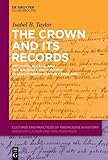The Crown and Its Records : Archives, Access, and the Ancient Constitution in Seventeenth-Century England / Isabel B. Taylor.
Material type: TextSeries: Cultures and Practices of Knowledge in History : Wissenskulturen und ihre Praktiken ; 13Publisher: München ; Wien : De Gruyter Oldenbourg, [2023]Copyright date: ©2023Description: 1 online resource (XI, 479 p.)Content type:
TextSeries: Cultures and Practices of Knowledge in History : Wissenskulturen und ihre Praktiken ; 13Publisher: München ; Wien : De Gruyter Oldenbourg, [2023]Copyright date: ©2023Description: 1 online resource (XI, 479 p.)Content type: - 9783110791266
- 9783110791563
- 9783110791464
- 020
- online - DeGruyter
- Issued also in print.
| Item type | Current library | Call number | URL | Status | Notes | Barcode | |
|---|---|---|---|---|---|---|---|
 eBook
eBook
|
Biblioteca "Angelicum" Pont. Univ. S.Tommaso d'Aquino Nuvola online | online - DeGruyter (Browse shelf(Opens below)) | Online access | Not for loan (Accesso limitato) | Accesso per gli utenti autorizzati / Access for authorized users | (dgr)9783110791464 |
Frontmatter -- Foreword and Acknowledgements -- Contents -- Introduction, focus, sources and method -- Part One: The Institutional Background -- 1 English archives: The beginnings -- 2 Records mismanagement -- 3 Preservation, misplacing, destruction, and embezzlement -- 4 Specific record-keeping situations: Provincial and legal records -- 5 Arrangement and description: Inventories, calendars, and records editions -- 6 Attempts at reforming government records before 1640 -- 7 The records in the Revolutionary era -- 8 The Restoration and afterwards -- 9 An ironic counterpoint: Sir Robert Cotton’s ‘private library’ -- Part Two: English Archives and the Seventeenth-Century Constitutional Controversies -- 10 Archives’ role in the constitutional debates, and the Whig theory of history -- 11 The English legal system in the seventeenth century and the permissions regime for the public records -- 12 The foundation of the seventeenth century: History, Reformation and the ‘Ancient Church’ -- 13 History-writing, treason, and censorship -- 14 The Society of Antiquaries, primary source research, and the Ancient Constitution -- 15 Sir Edward Coke, Magna Carta, and records seizures -- 16 Parliamentary research orders -- 17 Sir Robert Cotton as archival research assistant to government and Parliament -- 18 John Selden: Archival research, legal history, and constitutional activism -- 19 William Prynne and the counter-revolution in the records editions -- 20 Epilogue to Part Two: The Civil War, the Tower records clerks, and espionage -- Part Three: Secrecy and Access at the State Paper Office -- 21 Thomas Wilson’s appointment as Keeper: The political background -- 22 The establishment of the State Paper Office -- 23 Francis Bacon, George Villiers, and records classification -- 24 Practical problems at the State Paper Office: Records storage, Jacobean court intrigues, and money matters -- 25 The political uses of history and the Crown’s records -- 26 Records accessioning and power politics during Wilson’s tenure -- 27 Archives and intrigue: Wilson and the judicial persecution of Sir Walter Ralegh -- 28 The State Paper Office after Wilson -- 29 The Civil War and Interregnum -- 30 The Restoration, records seizures from Revolutionaries, and cataloguing -- 31 Official secrecy and research permissions -- 32 Use requests under James I -- 33 Use requests after the Restoration -- Conclusion: English archives and the wider European context -- Bibliography -- Biographical note -- Index of Persons
restricted access online access with authorization star
http://purl.org/coar/access_right/c_16ec
Archives are popularly seen as liminal, obscure spaces -- a perception far removed from the early modern reality. This examination of the central English archival system in the period before 1700 highlights the role played by the public records repositories in furnishing precedents for the constitutional struggle between Crown and Parliament. It traces the deployment of archival research in these controversies by three individuals who were at various points occupied with the keeping of records: Sir Robert Cotton, John Selden, and William Prynne. The book concludes by investigating the secretive State Paper Office, home of the arcana imperii, and its involvement in the government's intelligence network: notably the engagement of its most prominent Keeper Sir Thomas Wilson in judicial and political intrigue on behalf of the Crown.
Issued also in print.
Mode of access: Internet via World Wide Web.
In English.
Description based on online resource; title from PDF title page (publisher's Web site, viewed 26. Apr 2024)


